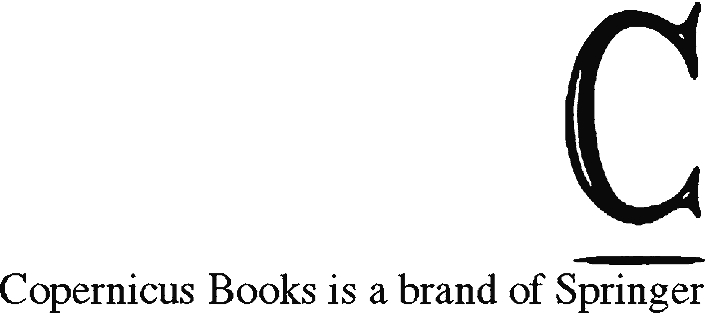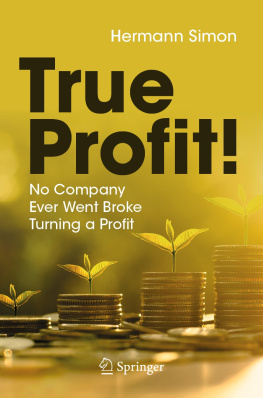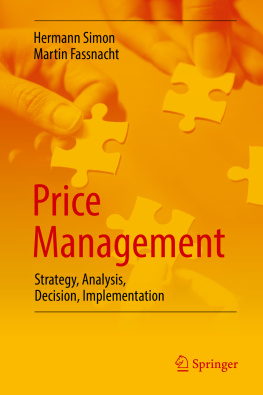Hermann Simon - No Company Ever Went Broke Turning a Profit
Here you can read online Hermann Simon - No Company Ever Went Broke Turning a Profit full text of the book (entire story) in english for free. Download pdf and epub, get meaning, cover and reviews about this ebook. publisher: Springer International Publishing, genre: Romance novel. Description of the work, (preface) as well as reviews are available. Best literature library LitArk.com created for fans of good reading and offers a wide selection of genres:
Romance novel
Science fiction
Adventure
Detective
Science
History
Home and family
Prose
Art
Politics
Computer
Non-fiction
Religion
Business
Children
Humor
Choose a favorite category and find really read worthwhile books. Enjoy immersion in the world of imagination, feel the emotions of the characters or learn something new for yourself, make an fascinating discovery.
- Book:No Company Ever Went Broke Turning a Profit
- Author:
- Publisher:Springer International Publishing
- Genre:
- Rating:5 / 5
- Favourites:Add to favourites
- Your mark:
- 100
- 1
- 2
- 3
- 4
- 5
No Company Ever Went Broke Turning a Profit: summary, description and annotation
We offer to read an annotation, description, summary or preface (depends on what the author of the book "No Company Ever Went Broke Turning a Profit" wrote himself). If you haven't found the necessary information about the book — write in the comments, we will try to find it.
No Company Ever Went Broke Turning a Profit — read online for free the complete book (whole text) full work
Below is the text of the book, divided by pages. System saving the place of the last page read, allows you to conveniently read the book "No Company Ever Went Broke Turning a Profit" online for free, without having to search again every time where you left off. Put a bookmark, and you can go to the page where you finished reading at any time.
Font size:
Interval:
Bookmark:


Translation from the German language edition: Am Gewinn ist noch keine Firma kaputt gegangen by Hermann Simon, Campus Verlag GmbH 2020. Published by Campus Verlag GmbH. All Rights Reserved.
This Copernicus imprint is published by the registered company Springer Nature Switzerland AG
The registered company address is: Gewerbestrasse 11, 6330 Cham, Switzerland
Profit is the cost of survival. If a company does not earn profits, it will go under sooner or later. This happens to thousands of companies every year.
A company must file for insolvency when it cannot pay its current liabilities. Illiquidity is the proximate cause, but it is not the reason for insolvency. The real reason is continued losses, which means that the resources a company puts in exceed the value it produces. That is unsustainable for private companies in the long run.
Starting a business is not too difficult. The bigger challenge is to run it profitably over time. Nine out of ten start-ups go bankrupt within the first 3 years. Why does this happen? The visible reason is a lack of liquidity. Ultimately, however, they go under because they have no profit prospects. Founders should therefore remember that turning a profit is a necessity, not a nice-to-have.
Profit is the opposite of waste. It is and will remain the sole criterion for the sustainable success and viability of a company. It is a companys bedrock pillar of support.
With those views in mind, one would expect to find a lot written about profit. But as a glance at amazon.com indicates, there is no book explicitly on the subject of profit. This book is the first one devoted exclusively to the topic. It illuminates the many dazzling facets of profit: its terminology, pursuit, ethics, causes, and drivers.
The contents of this book derive equally from my experiences as an academic researcher and as a practitioner. Perhaps one can fully explore the complexities of profit only if one knows profit firsthand from its theoretical and its real-world sides. The books numerous case studies and quotes from around the world reveal that profit has a deeply emotional side, and not only an economic one. Sometimes, an entrepreneurs fate ends tragically because he or she has relegated or neglected the profit motive.
I take a clear stand and leave no doubt about my conviction that entrepreneurs should be resolutely profit-oriented. Making a profit is not only the best long-term goal for a company but also a business leaders ethical responsibility.
With this book, I would like to put profit at the heart of what entrepreneurs, managers, and ambitious founders strive to accomplish. No company ever went broke from turning a profit.
Im for profit maximization!
If you want to infuriate large portions of society and turn people against you, uttering that sentence is a very effective way to do it.
Few phrases are more explosively controversial than profit maximization. Some people even go berserk when they hear the word profit. During a large demonstration against the German industrial giant Bayer AG at its annual shareholders meeting on April 26, 2019, I became involved in a discussion with the protesters. When I mentioned that a company needs to earn profits in order to survive, I was aggressively taunted and berated.
This kind of aggressive reaction seems to be universal. The maximization of profitor perhaps worse, the maximization of shareholder valueis considered by many observers to be the root of all economic evils. Of course, most rank-and-file employees oppose profit maximization. But beyond that, it doesnt matter whether the listeners are teachers, doctors, lawyers, or civil servants, not to mention the critics among political scientists, sociologists, or philosophers. There isnt even general consensus in favor of the profit concept among businesspeople.
But in its essence, profit maximization is simply the antithesis of waste. One could also equate profit maximization with waste minimization. Critics claim that the maximization of profit and shareholder value is responsible for the exploitation of resources and workers, for disparities in income and assets, for the offshoring of jobs to low-wage countries, for the relocation of corporate headquarters to tax havens, and many other abuses.
These criticisms stand in stark contrast to the theoretical groundwork of microeconomics. If a company doesnt strive to achieve the highest possible profit, it faces the risk that its competition will wipe it out. To co-opt the mantra from the scientific community, the ultimate law of business is profit or perish.
Profit is the reward for undertaking business risks. Profit is what is left over after a company meets all of its contractual obligations to its employees, suppliers, banks, other creditors, and the various national, state, and local governments that levy taxes. Profit is thus a residual that belongs exclusively to the companys owners. As soon as the company has met all of its obligations to outside parties, no one else can make any additional claims.
This simple and incontrovertible definition of profit is by no means generally accepted. During his tenure as French president, Nicolas Sarkozy declared that it is unfair that shareholders and owners get to keep all of a firm's profit, and that it would be more fair for company profits to be divided into three equal parts: one for the shareholders, one for employees, and one for re-investment into the company. In Sarkozys view, it is unacceptable that the owners of a company claim all of the profits for themselves. But isnt that tantamount to saying that it is unacceptable for employees to keep their net wages for themselves and allow no other parties to lay claim to their money? Nonetheless, populist statements such as Sarkozys enjoy broad public appeal.
Font size:
Interval:
Bookmark:
Similar books «No Company Ever Went Broke Turning a Profit»
Look at similar books to No Company Ever Went Broke Turning a Profit. We have selected literature similar in name and meaning in the hope of providing readers with more options to find new, interesting, not yet read works.
Discussion, reviews of the book No Company Ever Went Broke Turning a Profit and just readers' own opinions. Leave your comments, write what you think about the work, its meaning or the main characters. Specify what exactly you liked and what you didn't like, and why you think so.









